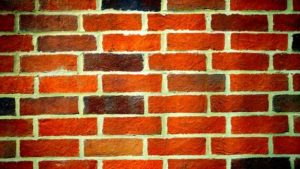
Brick is a sturdy material that makes residential fires less of a tragedy
Residential fires are entirely avoidable. The CDC reports that deaths and injuries caused by residential fires have declined within the past few years. The CDC attributes smoke alarm installation and fire safety education to this decline. Our mission is to help save lives and protect property. With that in mind, Judd Fire Protection is committed to keeping our clients and potential clients aware of the best fire safety practices. Today, we’d like to focus on some fire-resistant building materials. While no material is 100% fireproof, some materials make a fire hazard less possible. Here they are.
Windows: Fire-Resistant Glass
What’s dangerous about windows is that the glass can break even before a flame touches them. The intense heat of fire alone is enough to break the glass. What’s even more alarming is that a broken window allows a fire to enter a home. Fire-resistant windows are a sure-fire way to protect your home. Consider dual-paned glass. They are not only safer but energy-efficient as well. Because of this factor, it takes twice the time for a fire to break dual-paned windows. The thinner the glass is, the more of a risk it is. Tempered glass is also a viable option because it is heat-treated. It’s much more durable than standard glass. A nearby fire affecting you and your home is less of a concern with fire-resistant glass.
Concrete: Common but Effective
Concrete is a commonly used, fire-resistant building material. It is non-combustible and has low thermal conductivity. We mean by this, it takes a while for a fire to affect this element’s structural integrity. Did you know that concrete is more fire-resistant than steel? However, we should note that not all concrete is the same. Fire-resistant properties in concrete can change based on the type and amount of aggregates used. Natural aggregates do not perform as well, so that is something to keep in mind.
Brick Better Prepares Your Home for a Fire
If you’re familiar with the fable “The Three Little Pigs,” you may remember that the fox failed to blow down the house made of brick. Brick is not only wind-resistant, but it’s fire-resistant as well. Brick walls are less fire-resistant, but individual bricks have a lot of structural integrity. If a brick wall is thicker, it can take an hour or more for it to degrade, which is super advantageous if you want to protect your home.
Commercial and Residential Fire Prevention from Judd Fire Protection
If you want to ensure your home and business are safe throughout the year, trust Judd Fire Protection, LLC. We have over two decades of experience in designing, installing, inspecting, and repairing residential and commercial fire protection systems. We serve clients throughout Maryland, Pennsylvania, Washington, D.C., Virginia, and West Virginia. If you are interested in finding out more about our services and protecting your home and business, give us a call at 410-871-3480 or contact us online. For more fire safety tips, follow us on Facebook, Twitter, and Pinterest.
